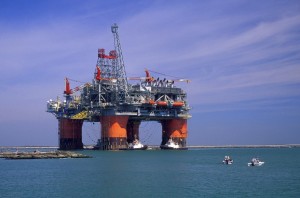The range of jobs on offshore oil rigs, trained and professional, are vast.
We would say that electrical, mechanical or engineering types of certificates (offshore oil rig jobs), diplomas and degrees justify most of the positions on offshore oil rigs. These would cover jobs like: oil rig managers and supervisors, oil rig mechanical and electrical engineers, drillers, tool-pushers and roughnecks, fitters, welders and boilermakers, mechanical maintenance staff, riggers, oil rig diesel mechanics, oil rig mechanics, oil rig compressor technicians, oil rig crane operators, etc. There are also roustabouts or deckhands on the oil rigs, which are generally skilled or semi-skilled staff and functionas cleaners, assistants and general tasks on the offshore oil rigs.
Qualifications in Oil and Petrochemical regions account for many oil rig positions on the oil rigs for operators and subsurface engineers. Geological qualifications also account for some positions on oil rigs such as: oil rig mud engineers and oil rig mud loggers. As safety and environmental protection is a huge responsibility on offshore oil rigs, qualifications in that region could get you a job on oil rigs. Deep water scuba divers are also employed by offshore oil rigs, even though this oil rig job career is not advised for too many years as it takes its toll on the human body (offshore oil rig jobs).
Doctors and paramedics (employed on offshore oil rigs) are important and may be found on any large offshore oil rig. If it’s a small manned platform, the doctor is only going to be a short trip away by vessel. Staff with IT diplomas on the oil rigs are found on offshore oil rigs too.
There are also the chefs and cooking and catering type certification is required on the offshore oil rigs. Oil rig Cleaners, which keep the living quarters, offices, galley and bathrooms clean, wash the washing, empty and sort garbage also make up an important part of the offshore oil rig staff. Without them, no one would want to work on the offshore oil rigs. Offshore oil rigs mostly look for staff already experienced in offshore oil rig work or trained specifically for offshore operations. The main reason for this is because of the busy and schedule and hazardous environment on oil rigs. This makes it hard to look after inexperienced oil rig workers, but this isn’t always the case. You should start somewhere.
Experience is crucial though. Needless to say, oil rig companies are extremely good at QHSE (Quality, Health, Safety, Environment) management and accident prevention nowadays. If you are interested in working on oil rigs and need to know the qualifications needed to do so, there are some to factor in. Depending on the type of oil rig job, you might need a college degree. Some labor jobs you don’t need any kind of skills and may be trained for oil rig jobs.
